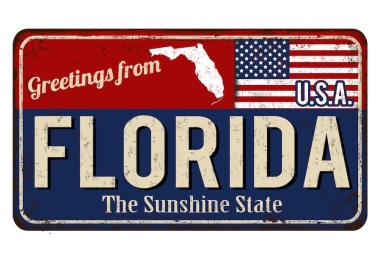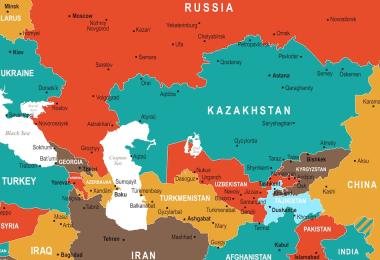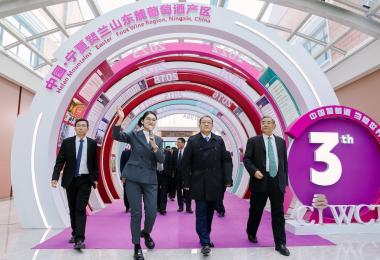Robert Mielżyński’s intimidating 6’ frame is what you’d expect from a former hockey player. He was a fighter even by the sport’s standards, as some less well-behaved customers of his wine bar (and a large number of his mobile phones, smashed on the floor in flashes of ire) have later found out.
But Mielżyński’s rowdy temperament hides sharp business acumen. Starting from scratch in a small and notoriously competitive market, he has built a brand that’s well known far beyond the limits of the wine trade.
The man with the handshake
Born in 1964, third son of Peter Mielżyński, a Pole expatriated to Canada in 1946, Robert studied oenology at the University of California in Fresno. He subsequently made wine in Bordeaux and the Loire before returning to Canada where he managed Hillebrand Estates (now Trius), one of the pioneer wineries in Ontario, founded by his father in 1980. Robert had initially planned to stay in Canada to work at Peter Mielzynski Agencies, one of the country’s leading wine and spirits distributors, now run by his brother Peter; Peter Sr. died in April 2016 aged 94.
Instead, he moved to Poland in 1996 with the idea of opening an innovative wine business. The dream came true in 2004. The business plan had been in development for nearly a decade and several of Robert’s European wine friends — as well as his father’s long-term contacts — contributed both funds and expertise.
The idea was inspired by the Viennese institution of Heurige, an urban winery-cum-tavern. “How to sell wine in the city centre?” asks Mielżyński, “People want to have a bite, taste a few wines by the glass and then drive away with a few cases in the trunk.” In the somewhat sedate context of the 2004 Warsaw wine trade, dominated by distribution multinationals with their high street chains and formulaic wine walls, the concept was highly original. Mielżyński sold bottles directly from wooden cases on the concrete floor; the bar offered bistro food and staff, down-to-earth advice. The choice of location was smart, too: central enough for city dwellers but with a revamped 19th-century factory offering plenty of space, shade, and parking. Mielżyński greeted every guest with his famous handshake, considered by many his secret business weapon: “The value of my handshake is overestimated,” he says. “Sure, being always there to greet people, knowing each client personally was part of the job. That way, they come back, again and again.” And they did — the place become so wildly popular that soon it was booked out days in advance.
Mielżyński’s expat status – he speaks Polish with a heavy accent – also helped attract high-profile foreigners, and before too long they were not only popping in for a glass of wine but also placing orders for corporate functions and Christmas gifts. After starting with a few dozen well-chosen references, including Kirwan and Figeac, Rioja’s Bodegas Lan, Lamberto Frescobaldi (a friend from school) and New World wines sourced from Vienna’s Schlumberger, Mielżyński quickly expanded his portfolio. He has an undeniable nose for both top brands and top quality; subsequent additions to the catalogue included Bürklin-Wolf, Deutz, Mazzei, Roda, Perelada, and Merryvale, but also three of the five Douro Boys properties (then virtually unknown in Poland), as well as more esoteric stuff from Sardinia, Greece, and Hungary. “The first part of any successful wine business is the buying. Once you have great quality and great value products, you can grow from there. The relationship with the winery is paramount to success, too,” he explains.
From strength to strength
The effect on the market was staggering. Mielżyński was essentially the first wine depot and wine bar run to truly European standards. The public was as enthusiastic as the trade was admiring. Many importers sought to follow the trends set by Mielżyński or downright copy his concept, with varying success. There is even an Italian emulation called Signorvino, founded by a textile executive who worked in Poland and was a habitué of Mielżyński; the chain now has 13 venues across Northern Italy.
The original Mielżyński bar in Warsaw’s Powązki district has also been the training ground for a number of Poland’s top sommeliers, including national champion Tomasz Kolecki. Another strength is Mielżyński’s professional approach to the wine press: He set new standards by regularly organising vertical tastings of his brands as well as hugely successful wine festivals for the wider public. The company gained extra momentum with the opening of a new venue in Poznań in 2009 and a second bar and shop in Warsaw in 2015.
With many top-tier customers, who can often be seen sipping a bottle of Château Palmer at the bar, Mielżyński has also become a coveted place to sell wine. This has shifted the relationship with suppliers in favour of Mielżyński, who has now become far pickier in his additions to the catalogue; he famously delisted Argentina’s Catena Zapata after a misunderstanding on the phone. But those vintners who continue to work with him are universal in their praise of the business — and the man.
Although not immune to criticism — which focuses on the food, and the high margins — Mielżyński has gone from strength to strength, and despite growing market competition, has managed to maintain his status as Poland’s premier fine wine importer.
The buying experience
So why has Mielżyński remained so successful? He cites a “winning combination” of cast-iron business plan, consumer education, and customer experience. He is also positive his decision to eschew broader distribution has paid dividends by enabling him to keep prices keen; “we’re just closer to the consumer than big distribution companies.”
This view is echoed by Tomasz Prange-Barczyński, editor-in-chief of Magazyn Wino, Poland’s only printed wine magazine, which has showered Mielżyński with more awards than any other importer: “Robert has set a new standard for selling wine in Poland,” he says. “He was the first guide into the world of wine for a large number of people who have moved to become permanent clients. In 2004, you could rarely taste a wine at a wine shop in Poland. At Mielżyński’s, you could taste each and every one on offer. You could walk between cases of fine wine, touch every bottle and talk about it — that was an entirely new concept.”
In fact, Mielżyński wine shops are more than just a collection of renowned labels with a wine-by-the-glass programme. They are about the “buying experience,” stresses their owner: “Poles have never before experienced the pleasure of shopping for wine.” The happy paradox is that while his catalogue holds enough treasures to whet any wine lover’s appetite, Mielżyński seems to primarily attract casual consumers who just want a nice glass of wine in a modern, trendy setting. By setting the stage for such a “buying experience”, Mielżyński managed to break through the wine importer’s glass ceiling — that of speaking to a narrow niche of wine buffs — and sail into the open waters of the mass market.
Cautious optimism
He is philosophical about several of his sommeliers moving to open their own imports: “It’s positive. It’s how we contribute to the industry’s growth. Education is essential — our sommeliers get constant training, winery trips, because their culture then helps increase sales and gives more value to the company.” The underlying approach is respect for customers, employees, and competition.
Indeed, Mielżyński does not see other fine wine distributors as his main competitors. Rather, he warns about supermarkets expanding into fine wine, such as Carrefour and Lidl: “It’s no secret: They have already embraced that category in countries like France. This is the challenge of tomorrow.” A much discussed clash took place in 2014 when Biedronka, Poland’s leading discounter with 35% of the wine market, listed Vallado Tinto from Portugal for 29.99 PLN ($7.80), one of Mielżyński’s best-selling brands with a shelf price of 49.50 PLN ($12.90). It wasn’t the first instance of Biedronka bullying smaller distributors, but instead of delisting Vallado as others did, Mielżyński struck back: he lowered the price to 29.50 PLN and widely publicised the fact he was “cheaper than a discounter.” His remaining stock sold out in 24 hours and the story even hit the general media.
Regarding his future development, Mielżyński is cautiously optimistic. “I’ve always carefully considered any next step to take. I take my time — sometimes too much,” he admits, adding that he looks forward to expanding to more cities in Poland, such as Wrocław, Gdańsk, and Cracow, but “will never franchise — I have to have full control over my team.” What he plans is a different wine bar format with tapas-like food.
Some experts argue the Polish wine market will become increasingly bipolar: supermarkets continuing to expand beyond their current 81% share of the market and fine wine gradually reduced to the on-trade. Consolidating his position in the latter is a priority for Mielżyński, but he remains bullish on the retail side of the business: “My concept is still the right concept. Poles want a proper wine buying experience. For this, I need large shops where I can continue to offer quality and variety, for every winemaking country I list.”
Mielżyński Wines Spirits Specialities
Established: 2004
Owner & CEO: Robert Żychliński-Mielżyński
Retail venues: 3
Employees: 104
Turnover in 2015: 28m PLN ($7.3m)
Portfolio: wines from 16 countries, focus on France, Italy, Spain, Portugal, Germany, Austria
SKUs: 650








